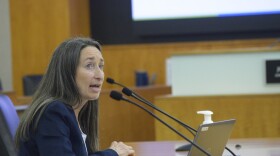-
A federal agency has given the Clinton nuclear power plant another 20 years of life.
-
Normas Director of Zoning and Planning Mercy Davison said town staff is making great progress in the town’s Vision 2050/Sustainability plan. Davison gave an update to the Normal Town Council at Monday's meeting.
-
A supplemental environmental impact statement filed this spring by Nuclear Regulatory Commission staff will likely advance the operating license renewal request filed by Constellation Energy, owner of the Clinton nuclear power plant.
-
The Ecology Action Center in Normal urges Bloomington-Normal residents to stay in the municipal electric aggregation program even with hefty rate increases coming this summer.
-
Illinois lawmakers are trying the curb plastic production by limiting foam food containers and single-use plastic bags, which contribute to rising plastic levels in lakes and groundwater sources like the Mahomet Aquifer.
-
A dedicated permanent hazardous household waste collection facility in McLean County would encourage more people to properly dispose of dangerous materials. That’s one of the key takeaways from a feasibility study presented this week to a county board committee.
-
Although the Trump Administration rescinded a memo announcing a freeze on federal allocations Wednesday, the head of the nonprofit Ecology Action Center in Normal says its grant funding is still jeopardized by an earlier executive order.
-
The Redbird Fresh Market is an example of what can happen when college students imagine — and then execute — an idea to fruition. The new student-led program is helping off-campus students gain easier access to healthy foods.
-
The City of Bloomington is getting a $600,000 state grant to build a green infrastructure park near to the community sewage treatment plant on the west side of town. It's the Sunnyside Park Sustainability Initiative.
-
The city manager for the Town of Normal says it will take a long time to fully implement the newly-approved sustainability plan.
Play Live Radio
Next Up:
0:00
0:00
Available On Air Stations










